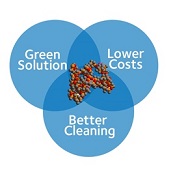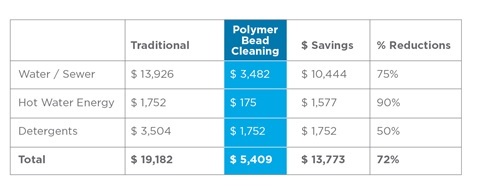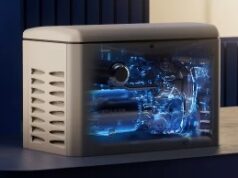 Everyone wants to go green. It’s good for the environment and it’s good for business. But isn’t there a better way than just asking customers to reuse their towels? Commercial laundry has been done the same way for more than 60 years—lots of water, detergent, and agitation to get the stains out. But now a new kind of technology uses tiny polymer beads to get hotel linens and towels even cleaner than before, and uses much less water and detergent in the process—this means it actually costs less to go green. This article will explore how the hospitality industry is starting to use innovative polymer bead technology for its commercial laundry operations to deliver superior cleaning power, while saving money and helping the environment.
Everyone wants to go green. It’s good for the environment and it’s good for business. But isn’t there a better way than just asking customers to reuse their towels? Commercial laundry has been done the same way for more than 60 years—lots of water, detergent, and agitation to get the stains out. But now a new kind of technology uses tiny polymer beads to get hotel linens and towels even cleaner than before, and uses much less water and detergent in the process—this means it actually costs less to go green. This article will explore how the hospitality industry is starting to use innovative polymer bead technology for its commercial laundry operations to deliver superior cleaning power, while saving money and helping the environment.
Going Green in the Hospitality Industry
The hospitality industry is striving to be greener. But according to some benchmarks, there’s a lot of room for improvement.
Newsweek’s 2012 Green Rankings hotel industry summary states, “The industry’s sustainability initiatives lag behind other consumer-facing industries, such as retailers and food and beverage companies. On the whole, companywide environmental programs have been reactive and fail to demonstrate an innovative approach. The industry could benefit from increased transparency on quantitative emissions, water and waste data, and related reduction targets.”
Part of the problem is size, and the fact that hotel guests expect superior cleanliness and comfort. Where we may give up some creature comforts at home, as hotel guests, we expect the very best. Bjorn Hanson, divisional dean of New York University’s school of tourism and hospitality management, states, “It’s very difficult for hotels to be truly green by their nature. Daily cleaning consumes chemicals and energy, and public spaces are 30 percent to as much as 70 percent of the square footage of a hotel and must be lighted, cooled and heated.”
Reducing the use of energy, water and chemicals is essential for the hospitality industry’s sustainability efforts. Typically, green initiatives are something the industry struggles with because they often cost more money. However, in the case of commercial laundry, re-examining the technological process for cleaning has resulted in a new innovation that delivers cleaner laundry in a greener way—at a lower cost than traditional washing machines.
A Focus on On-Premise Commercial Laundry for Hotels
Commercial laundry has been done the same way for 60 years. And in fact, today’s traditional washing machines only serve as a way to automate the centuries-old process of beating a garment against a rock in a stream. There must be a better way to get laundry clean.
If someone were to start from scratch to create a new type of laundry system incorporating today’s technology advances, it would also make sense to use fewer resources—less water, less energy, less detergent. What if you could do an even better job cleaning laundry and use resources more efficiently at the same time? What if your hotel’s laundry system could use up to 70 percent less water; use 50 percent less energy (due to lower temperatures); use approximately 50 percent less detergent as compared to conventional washing; and deliver superior cleaning results?
These savings are not insignificant, given that the approximately 5 million hotel rooms in the United States rack up almost $4 billion in energy bills a year, or about $800 per room annually, according to Ashley Katz, spokeswoman for the Washington, D.C.-based U.S. Green Building Council.
A New Innovation: Polymer Bead Cleaning Technology
There is something new in commercial laundry. A new innovation—based on the hydrophilic properties of polymer beads—delivers a trio of benefits: better cleaning, lower cost, and a green solution.
 A hydrophilic molecule or portion of a molecule is one that is typically charge-polarized and capable of hydrogen bonding, enabling it to dissolve more readily in water. By combining the beads’ molecular structure with a proprietary detergent solution, dirt from soiled items is attracted and absorbed by the beads, producing cleaner results. These reusable beads have a lifespan of hundreds of washes before being collected and recycled.
A hydrophilic molecule or portion of a molecule is one that is typically charge-polarized and capable of hydrogen bonding, enabling it to dissolve more readily in water. By combining the beads’ molecular structure with a proprietary detergent solution, dirt from soiled items is attracted and absorbed by the beads, producing cleaner results. These reusable beads have a lifespan of hundreds of washes before being collected and recycled.
Who is Using this New Technology?
Hotels are just starting to adopt polymer bead cleaning technology for their commercial laundry. This is part of a wider trend where hotels are increasingly adopting green practices to conserve resources and reduce their costs.
Besides the cost benefits, there are less-tangible benefits such as gaining a competitive advantage, increasing customer loyalty, and boosting brand value by “going green.” For example, hotels listed on Travelocity’s Green Hotel Directory draw a 94 percent customer-satisfaction rating, compared with 83 percent for other hotels. These “soft” benefits can also have a big impact.
Hotels, such as those within Hyatt, have made strong commitments to implement more sustainable business practices. Through its Hyatt Earth program, Hyatt has set goals to reduce the energy and water they use, and measure their environmental performance against a baseline.
To help in this effort, the Hyatt Regency in Reston, Va., has implemented an ultra-low water, polymer bead cleaning system for its commercial laundry. General Manager David Eisenman states, “The polymer bead technology is truly amazing. It has absolutely delivered on the promises of savings and superior performance.”
Cut Commercial Laundry Costs in Half
The benefits of a polymer bead cleaning system include both immediate savings from decreased laundry costs and savings over time from an increased useful life of linens.
By converting in-house laundry operations to a polymer bead washing system, hotels can cut laundry costs by up to 50 percent or more with immediate savings in water, energy and detergents.
In addition, because hotel linens get cleaner and tough stains are removed better with this new technology, the linens can be used for longer periods of time. The polymer bead cleaning solution routinely outperforms traditional washing methods with today’s laundry machines. As a result, hotels can deliver cleaner linens to their guests and keep their inventory in circulation longer.
Finally, by converting to a polymer bead cleaning solution, hotels are able to demonstrate their commitment to green practices and advance their environmental sustainability efforts.
The table below shows how a polymer bead cleaning system can cut total costs by 72 percent annually for a more than 250 room hotel. Typical results vary depending on occupancy rates, water/utility costs and the number of pounds of laundry processed and number of rooms.

Summary
Water rate increases are expected to increase at double the rate of inflation over the next five years. This means that green practices are becoming even more important. Polymer bead cleaning can help deliver water and energy savings for a greener clean, while at the same time delivering cleaner laundry.
About the Author
This new technology described above is being introduced for the first time by Xeros Cleaning (www.xeroscleaning.com). The company has patented this polymer bead technology for commercial laundry and is now introducing it to the hospitality industry in North America and the United Kingdom. Jonathan Benjamin, Xeros North America President, is responsible for the commercialization and adoption of Xeros’ technology in North America. His diverse background ranges from consulting with large, complex global organizations to working intimately with start-ups to launch their products and services. Prior to his role at Xeros, Jonathan was president of Envoy Services, a diversified management and holding company that owns a number of commercial laundry related businesses located in the eastern United States. Jonathan began his career at GE Capital and was a participant of General Electric’s leadership program. He studied at Bucknell University and MIT.







